Self-management
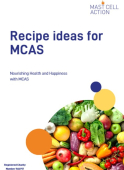
Recipe Ideas for MCAS
From our Nourishing Health & Happiness with MCAS series — simple, nourishing recipes designed to support digestion, comfort, and everyday enjoyment.
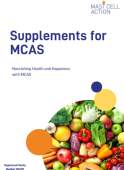
Supplements for MCAS
From our Nourishing Health & Happiness with MCAS series — evidence-informed guidance on supplements that may support wellbeing in MCAS.
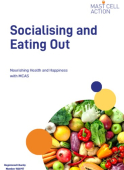
Socialising and Eating Out
From our Nourishing Health & Happiness with MCAS series — practical tips for enjoying meals out and social occasions while supporting your health and comfort.
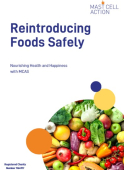
Reintroducing Foods Safely
From our Nourishing Health & Happiness with MCAS series — a gentle guide to reintroducing foods, helping you expand your diet with confidence and care.
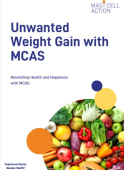
Unwanted Weight Gain with MCAS
From our Nourishing Health & Happiness with MCAS series — explore possible causes of weight changes and find balanced ways to support a healthy body and mind.
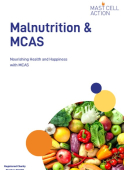
Malnutrition and MCAS
From our Nourishing Health & Happiness with MCAS series — understand the risks of malnutrition with MCAS and learn how to nourish your body safely and effectively.
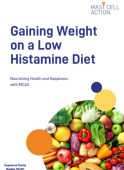
Gaining Weight on a Low Histamine Diet
From our Nourishing Health & Happiness with MCAS series — gentle, practical ideas for maintaining or gaining weight while following a low histamine approach.
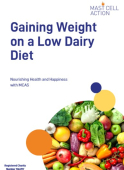
Gaining Weight on a Low Dairy Diet
From our Nourishing Health & Happiness with MCAS series, discover nourishing, dairy-free or low dairy ways to support healthy weight gain while meeting your body’s needs.
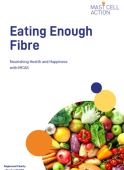
Eating enough fibre with MCAS
From our Nourishing Health & Happiness with MCAS series — discover simple, gentle ways to include more fibre for better gut health and overall wellbeing.
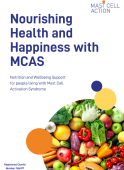
Nourishing Health and Happiness with MCAS
We have worked with registered dietitian, Chloe Hall, to explore some of the most common diets followed by people with MCAS, and the key nutritional concerns that often arise. In this resource, we’ll look at practical ways to support your diet when living with MCAS.
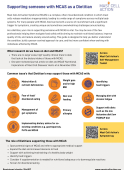
Supporting someone with MCAS as a Dietitian
Supporting Someone with MCAS as a Dietitian is a practical resource designed to help dietitians understand and support people living with Mast Cell Activation Syndrome. It offers guidance on the unique challenges that MCAS presents, particularly around food, nutrition, and symptom management.
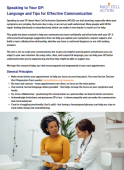
Speaking to Your GP: Language and Tips for Effective Communication
This guide has been created to help you communicate more confidently and effectively with your GP. It offers practical language suggestions that can help you explain your symptoms, request support, and build a more collaborative relationship, whether you have a confirmed diagnosis or are still seeking answers.
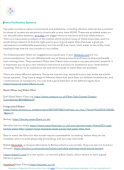
Introduction to Water Purifiers
Handout on different types of water purifiers, created by Deborah Bircham
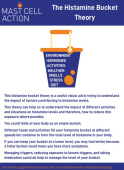
The Histamine Bucket Theory
This histamine bucket theory is a useful visual aid in trying to understand the impact of factors contributing to histamine levels.
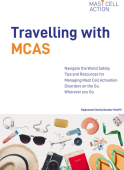
Travelling with MCAS
This downloadable booklet contains tips and resources for managing Mast Cell Activation Disorders on the go, wherever you go.
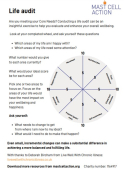
Life Audit
Are you meeting your Core Needs? Conducting a life audit can be an insightful exercise to help you evaluate and enhance your overall wellbeing.
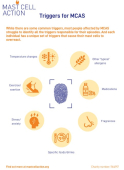
Triggers
This resource details some of the more common triggers of Mast Cell Activation Syndrome.
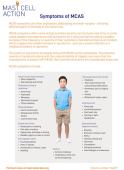
Symptoms of MCAS
This resource details some of the more common symptoms of Mast Cell Activation Syndrome.
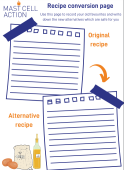
Recipe Conversion
You can use this blank recipe conversion page to note down any MCAS friendly changes you have made to your favourite recipe's.
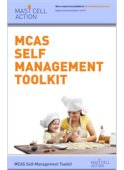
MCAS Self-management toolkit
This toolkit contains information about substances in food and in the environment that can affect mast cell activity or trigger MCAS symptoms. It also includes practical advice to help you understand and avoid these triggers, as needed.
Become a friend
Sign up to become a Friend of Mast Cell Action so we can keep you up to date on our progress and on how to get involved in our latest campaigns and initiatives.
Donate
Mast Cell Action relies entirely on the generosity of people like you. Please make a donation now and together we can make a difference to those affected by MCAS.







